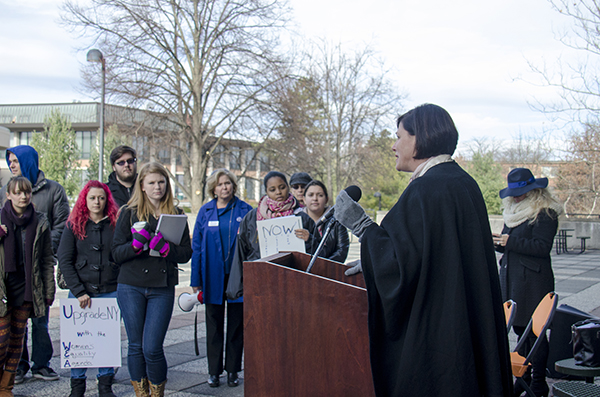

Nearly 50 students gathered at noon on Thursday, Nov. 21 on the Student Union (SU) concourse for a rally in support of the Women’s Equality Agenda (WEA), a 10 point piece of legislation strengthening language in laws against sexual harassment, pay inequality, human trafficking and various forms of discrimination against women that failed to pass into law last year.
Professor of Political Science and International Relations Kathleen Dowley said the event was organized quickly after she received a phone call from Tiffany Card, the director of public affairs and communications at the Planned Parenthood of the Mid-Hudson Valley, who was interested in setting up an additional rally stop in New Paltz.
“It was all pulled together very quick when I got the call,” Dowley said. “But it was a good, solid turn out for an event of its size and students really connected with the speakers.”
Tracey Brooks, the president and CEO of Family Planning Advocates of New York State, was introduced by Card during the rally to discuss the importance of mobilizing in support of the legislation during the next few months.
“One of my students said ‘I want to be her [Brooks] when I grow up,” Dowley said.
Dowley said that the group in attendance was a collection of students from the Women’s, Gender and Sexuality Studies (WGSS) program and other students less familiar with activism. Some students from ‘Women: Images and Realities,’ the general education introductory course within the WGSS program, were there as part of their final project, a “liberating action” using the information learned in their studies.
“It can sometimes be intimidating for someone [new to activism] to get started,” Dowley said. “But, this is a small step to dismantling things like patriarchy and making those social changes.”
According to the specific language of the bill, the WEA “would break down barriers that perpetuate discrimination and inequality based on gender” through 10 points seeking to stop a variety of forms of discrimination and protect victims of certain crimes.
“It’s an update of the language and policies that are outdated,” Dowley said.
The act seeks in part to change the phrasing of pay equality laws. Through replacing an exception that prohibits differences in pay for “any factor other than sex” with one that was “based on a bona fide factor other than sex such as education, training or experience,” the bill would ensure factors are job-related. It also includes provisions that would “forbid employers from prohibiting employees from sharing wage information.”
Other points in the act look to apply the current Human Rights Law provisions on sexual harassment to employers with fewer than four employees; amend the Penal Law to address human trafficking violations and make other changes to the Social Services Law, Public Health Law, Labor Law and Executive Law.
Dowley said the parts of the bill that faced opposition dealt with matters of reproductive rights.
The section labeled “Protecting a Woman’s Freedom of Choice” proposes to align State law with the existing federal law which “protects a woman’s right to terminate her pregnancy when necessary to protect the health and life of the woman.”
However, the bill explicitly states the section, labeled “Part J,” would not “conflict with any applicable state or federal law or regulation permitting a healthcare provider to refrain from providing abortions due to the provider’s religious or moral beliefs…” or extend anything beyond the federal laws already in place.
“It codifies the federal laws on the state level,” Dowley said.
Dowley said those unfamiliar with the WEA legislation would be surprised at how “basic” many components of the act are despite the current law lacking the specific language.
“Some of my [Women’s, Gender and Sexuality studies] students were, of course, disappointed that [the legislation] wasn’t more radical or including language about trans women…” Dowley said. “It’s important, though, to recognize the small victories and steps to that social change.”
Dowley said the goal of the rally was to “mobilize” and garner support for the act when it is up for consideration again in January.
“Women are, after all, a force in the polling booths,” Dowley said. “And we especially need to mobilize come spring.”
